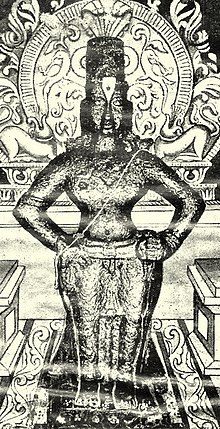Abhang
Abhanga is a form of devotional poetry sung in praise of the Hindu god Vitthal, also known as Vithoba. The word "abhang" comes from a for "non-" and bhanga for "ending" or "interrupting", in other words, a flawless, continuous process, in this case referring to a poem.[1] By contrast, the devotional songs known as Bhajans focus on the inward journey. Abhangs are more exuberant expressions of the communitarian experience.[2] Abhanga is considered a form of the ovi. Abhangs are sung during pilgrimage to the temples of Pandharpur, by the devotees.[3][4]

Practise
Marathi bhajans start with the naman (invocation of god), followed by the Roopancha Abhang (Portraying the physical beauty of god by personifying in the human form) and towards the end bhajans giving spiritual and ethical messages are sung.
Some famous musicians for Abhangs are
It has become integral in Bhajan concerts across India.
History
Bhakti Sampradaya or Namasankeerthana Sampradhaya was pioneered by
.Tukaram was a seventeenth century poet who lived in the town of





References
- ^ Gowri Ramnarayan: Eclectic range at The Hindu, 8 November 2010
- ^ Serish Nanisetti, Gowri Ramnarayan: A mix of rhythm and melody at The Hindu, 7 November 2010
- ^ "Articles – Devotional Music of Maharashtra – by Chaitanya Kunte". swarganga.org. Retrieved 22 May 2015.
- ISBN 978-0-231-51256-5.
- ^ "Concert conjures up magic of abhangs". Hindu. Hindu. 21 November 2011. Retrieved 8 December 2014.

